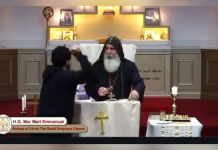Now that the Iwerne camps at which the serial abusers John Smyth and Jonathan Fletcher groomed their victims are closing, should the evangelical Christian organisation running the holidays since 1997, the Titus Trust, close as well?
Because the victims of Smyth’s savage beatings made disclosures to various current clergy in the Church of England with former Iwerne dormitory officer, the Archbishop of Canterbury Justin Welby hearing of the abuse in 2013, its national safeguarding team has commissioned a lessons learned review of its handling of the Smyth abuse scandal, due to be published next year.
Even before this review led by the highly respected Keith Makin, a former director of social services, appears, question marks are hanging over the future of the Titus Trust. Can there be a positive role for a scandal-hit organisation that specialises in evangelical ministry to children at elite fee-paying schools in England and Wales?
It is possible to make a case that there could be such a role in the future but only if the Titus Trust makes deeply intentional changes of attitude within the culture of its organisation.
Unless Britain becomes a Marxist state, an island version of North Korea off the coast of France, private boarding schools are going to be a reality in a free market economy. Don’t lost sheep confined in these institutions need to be reached for Christ?
‘The Son of Man came to seek and to save the lost provided their aspirational middle-class parents don’t send them to prestigious boarding schools.’ That does not appear to be an accurate rendering of Luke 19v10.
If the Titus Trust can get rid of the idea that the young people it is supposed to be serving are ‘strategic’ because they are privately educated, then it might be able to do useful gospel work in 21st Century Britain. But it needs intentionally to refrain from giving such young people the idea that destined and entitled to emerge from their number are the future leaders of the large and affluent conservative evangelical churches in the Church of England.
Even apart from the abuse associated with Iwerne, that arrogant sense of leadership entitlement, promoted particularly by Jonathan Fletcher over the five decades he was a major influence at the camps, has done damage and caused division in Christian unions, local churches and the wider evangelical constituency. It needs to be repented of.
Furthermore, it is difficult to see how a more modest, humble Titus Trust would go on hiring the services of a prestigious public relations company in London’s West End. This is even harder to understand in view of the fact that the managing director of Alder UK is a trustee of Stonewall, which uses its considerable political influence to promote the LGBT agenda in British schools and colleges.
A blog post I wrote in 2010 about my school-boy experience in 1979 and 1980 of the summer camps then held in the Dorset village of Iwerne Minster is quoted in a moving memoir by the Cambridge University academic Alan Macfarlane. As a school boy in the late 1950s, Professor Macfarlane also went to Iwerne. This blog was written before the Smyth and Fletcher scandals became public but I hope it still makes a valid point:
‘The talks morning and evening were a wonderfully clear, biblically faithful and winsome presentation of the Christian gospel of salvation. It is not the fault of anyone that they are institutionalised in the English boarding school system from the age of eight. The fact that Iwerne Minster was prepared to bring the gospel to those so spiritually and emotionally disadvantaged is surely something to thank God for, even if it did perceive its intended targets as “strategic” in producing an evangelistic trickle-down effect nationally. This has manifestly not happened.’
There are those who make fair criticisms of the Iwerne culture, but whose fundamental objection to the Titus Trust work seems to be theological. The lawyer and author Charles Foster has recently written about his experience of Iwerne. As Cambridge students in the mid-1980s, he and I were contemporaries as Iwerne ‘junior officers’.
He has made various points about the quasi-cultish character of Iwerne at that time which I would agree with. But where he and I would differ is that I still believe that Jesus is the Christ who died in my place on the Cross whilst Charles Foster no longer does.
Titus Trust’s detractors take particular exception to the classic evangelical doctrine of substitutionary atonement, which they argue Smyth used to justify his violence. This doctrine is certainly summed up in the chorus Charles Foster and I used to sing at Iwerne: ‘At the Cross of Jesus pardon is complete/Love and justice mingle/Truth and mercy meet/Though my sins condemn me Jesus died instead/There is full forgiveness in the blood He shed.’
But this doctrine of substitutionary atonement, which many today find so offensive, is in fact proclaimed by the Anglican Book of Common Prayer. In their rendering of 1 John 2v1-2a, the BCP’s Comfortable Words at Holy Communion present Jesus Christ as ‘the propitiation’ for our sins. The BCP’s Order for Holy Communion then goes on to celebrate the ‘full, perfect, and sufficient sacrifice, oblation and satisfaction for the sins of the whole world’ which Jesus Christ made upon the Cross. So, according to the BCP the willing and obedient sacrifice the divine Son of God made upon the Cross satisfied God’s justice against evil, turned away his righteous anger from sinful humanity and thus made possible our redemption according to the loving purpose of God.
If Smyth twisted this beautiful doctrine to justify abusing people made in the image of God, then that was an abuse of the biblical message of the Cross which calls every Christian to love and serve others in self-sacrificial ways. It is not a reason for rejecting the idea that Christ died in our place on the Cross or for insisting that an evangelical para-church organisation that teaches it should close down.
Julian Mann is an evangelical journalist based in Morecambe, Lancashire, and author of Christians in the Community of the Dome










